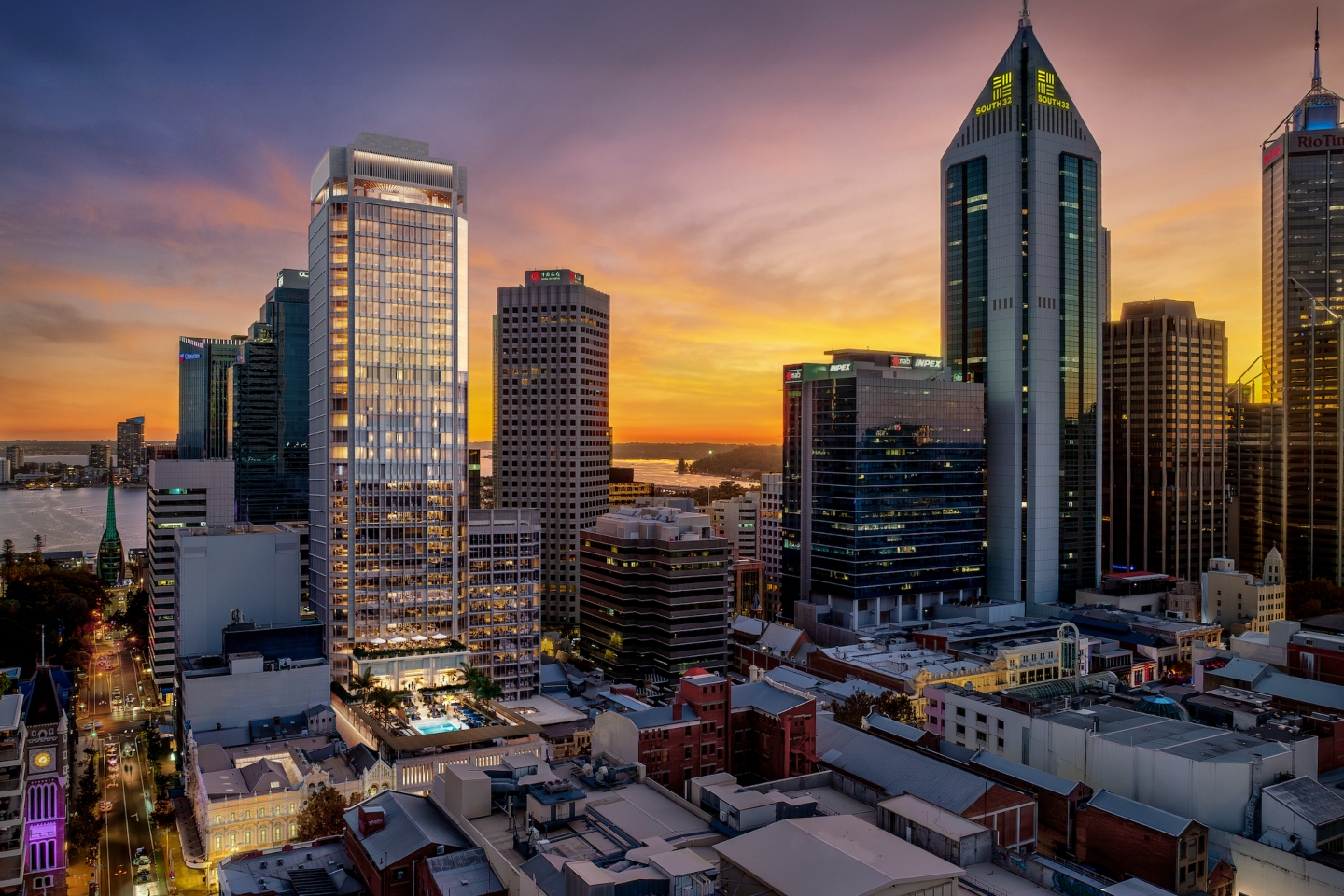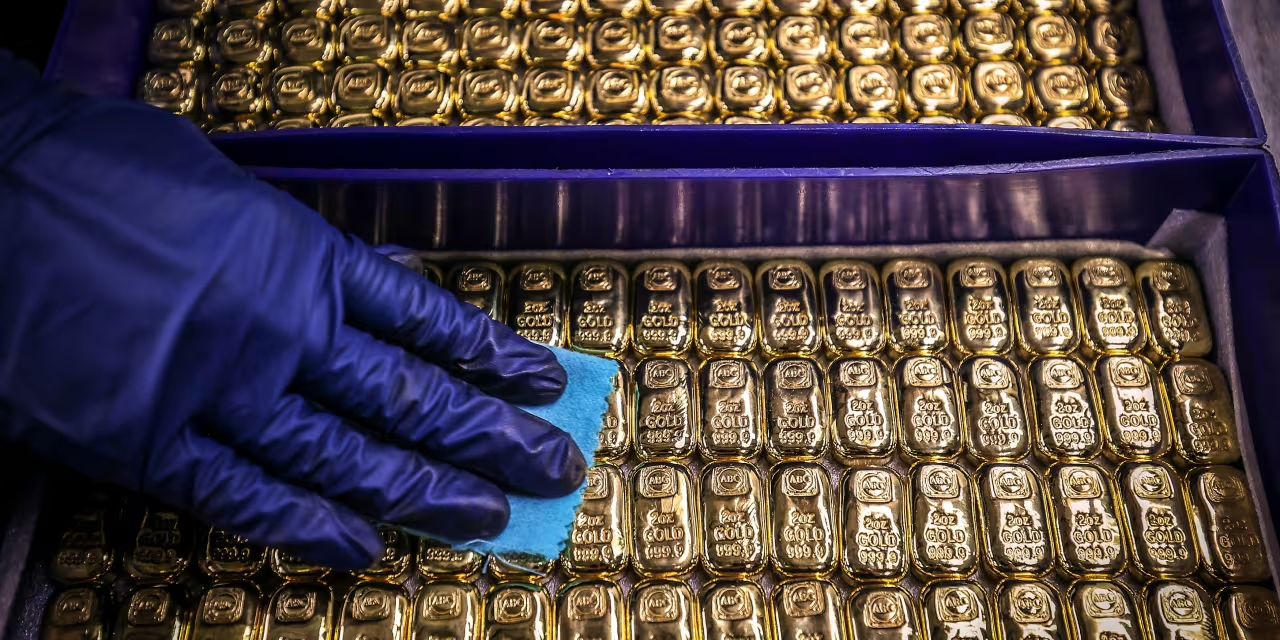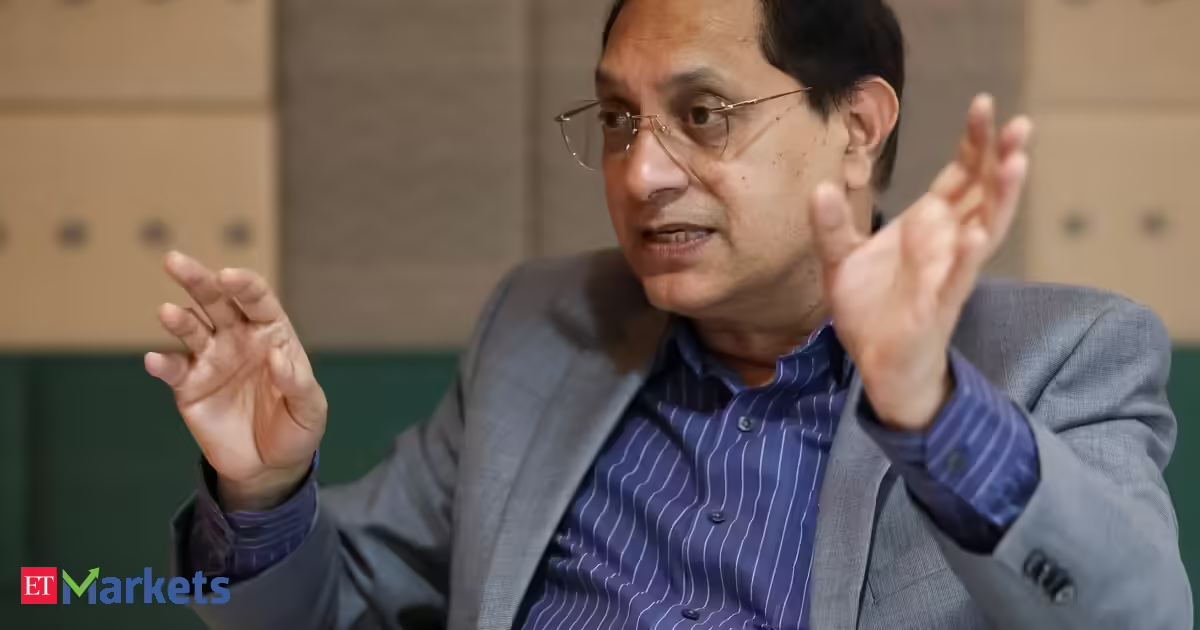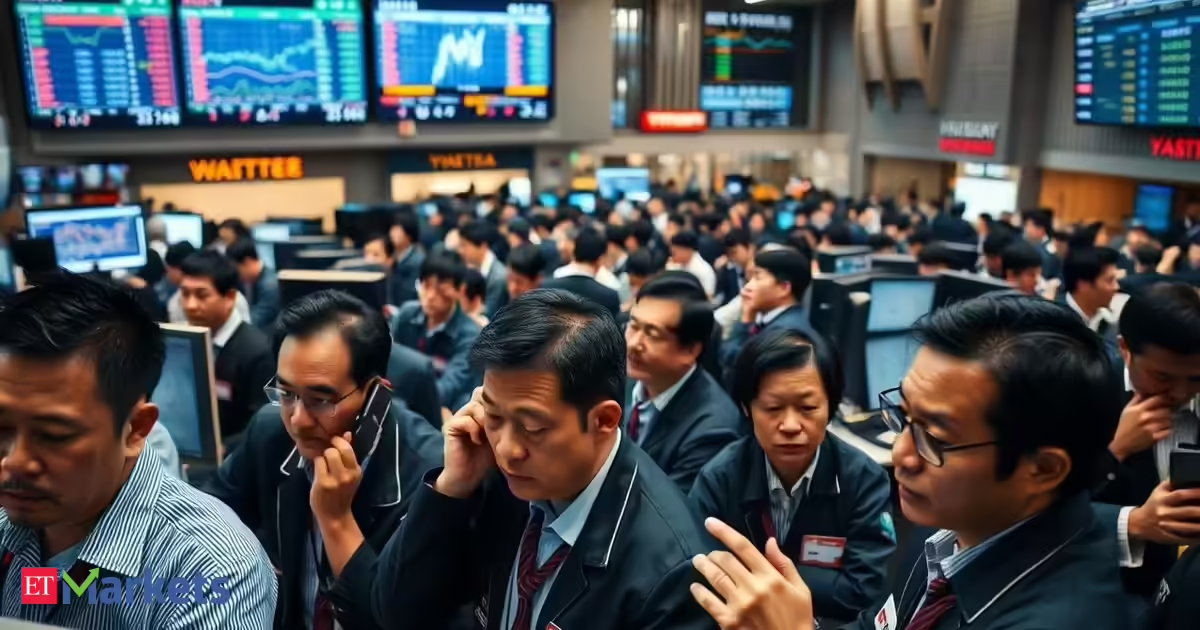Business
Why are more bosses sharing the top job?

Business
QUALCOMM Incorporated 2026 Q1 – Results – Earnings Call Presentation (NASDAQ:QCOM) 2026-02-04

Seeking Alpha’s transcripts team is responsible for the development of all of our transcript-related projects. We currently publish thousands of quarterly earnings calls per quarter on our site and are continuing to grow and expand our coverage. The purpose of this profile is to allow us to share with our readers new transcript-related developments. Thanks, SA Transcripts Team
Business
Chrysler recalls 450,000 vehicles over light brake failure safety risk concern

Check out what’s clicking on FoxBusiness.com.
Chrysler is recalling more than 450,000 vehicles and more than 2,000 tow-trailer modules over a light brake failure that could raise the risk of a crash, according to the National Highway Traffic Safety Administration (NHTSA).
The recall impacts 456,287 vehicles and an additional 2,871 tow-trailer modules, the NHTSA said in a pair of notices on Monday.
The affected vehicles contain the faulty modules, which the agency said were improperly designed.
TOYOTA RECALLS 161K TUNDRA TRUCKS OVER REARVIEW CAMERA DEFECT THAT INCREASES CRASH RISK

Chrysler is recalling more than 450,000 vehicles and more than 2,000 tow-trailer modules over a light brake failure. (Bing Guan/Bloomberg via Getty Images / Getty Images)
The modules impacted by the recall may result in the brake lights on attached trailers failing to illuminate, or they may cause trailer brakes to fail altogether, cutting visibility and increasing crash risk.
The impacted products include the 2026 Jeep Cherokee, 2024-2026 Jeep Wagoneer S, 2025-2026 Ram 1500, 2025-2026 Ram 2500, 2025-2026 Ram 3500, 2025-2026 Ram 4500, 2025-2026 Ram 5500 and certain Mopar tow-trailer modules.

The affected vehicles contain the faulty modules, which were improperly designed. (Graham Hughes/Bloomberg via Getty Images / Getty Images)
Anyone with the recalled tow-trailer modules installed can take them to their Fiat Chrysler Automobiles dealer for a free replacement. If the module is not installed, dealers will repurchase the item.
If the tow-trailer module is installed in a vehicle, dealers will replace it for free. If the tow-trailer module is not installed in a vehicle, dealers will repurchase it.
TOYOTA RECALLS ABOUT 127K PICKUP TRUCKS, SUVS OVER POTENTIAL ENGINE ISSUES

The modules impacted by the recall may result in the brake lights on attached trailers failing to illuminate, or they may cause trailer brakes to fail altogether, cutting visibility and increasing crash risk. (Getty Images / Getty Images)
GET FOX BUSINESS ON THE GO BY CLICKING HERE
Owners of recalled vehicles that come with the module installed can take them to their Fiat Chrysler Automobiles dealer for a free replacement.
Owner notification letters will be sent out on March 24, 2026.
Business
CBD skyscraper to become hotel

After years of speculation, a $250 million plan to overhaul the Kuwait government-owned St Martins Tower has finally been revealed.
Business
Gold, Silver Prices Surge to Reignite Rally. Why They’re Rebounding After Selloff.

Gold, Silver Prices Surge to Reignite Rally. Why They’re Rebounding After Selloff.
Business
No immediate steps planned to regulate equity derivatives: Tuhin Kanta Pandey

“At this moment, we are not contemplating any measures, and whatever framework that we have put in place, that will continue,” Pandey said. “When we as a regulator look at derivative markets, we do so in a very methodical manner based on data.”
The government raised transaction taxes on equity derivatives in the Union Budget to curb speculative trading. India’s futures and options volumes are more than 500 times the country’s GDP, underscoring the need for arate adjustment to rein in excessive activity, it said.
Separately, on the US-India trade deal, he said it would help get more investments into the country.
“Fundamentally, when you have an overhang of a regulatory action which is removed, and trade frictions removed, capital formation is always accelerated,” Pandey said. He added that the removal of the uncertainties can spur investment decisions and get a greater predictability on capital. “So overall in the situation I could say that with the deals that have been done on the trade side, a lot of uncertainties have been removed,” he said.
Algo Trades may Soon Not Face OTR Penalties
The Securities and Exchange Board of India (Sebi) on Wednesday proposed changes to its order-to-trade ratio (OTR) framework for equity options, to exempt algorithmic orders placed by market makers from OTR penalties.
Under the revised framework, for equity option contracts, orders placed within a range of 40% above or below the last traded price (premium) “or ± ₹20, whichever is higher, shall be exempted from the framework for imposing penalty for high OTR,” the regulator said in a circular.At present, stock exchanges place economic disincentive for high order-to-trade ratio of algorithmic orders placed by stockbrokers. Further, algorithmic orders placed by designated market makers for market making activity would not be considered towards computation of OTR, Sebi said. “Orders placed within the range of ±0.75% of the LTP shall be exempted from the framework for imposing penalty for high OTR,” it said
No Fresh Curbs on Equity Derivatives
Pandey was speaking at the launch of a corporate-bond outreach event, where he noted that measures are being considered to deepen the bond market. Sebi will engage with market participants on implementing the Budget proposals related to corporate bonds, he said.
The recent Budget has proposed a series of reforms aimed at improving liquidity in the secondary market.
“A market-making framework will support continuous twoway quotes, reduce bid-ask spreads, and improve price discovery, thereby making corporate bonds a more reliable asset class for investors,” Pandey said. “Derivatives on corporate-bond indices and total-return swaps will help investors in efficient risk management. As secondary-market liquidity improves and investor base widens, the corporate-bond markets will become a more reliable and cheaper funding route for issuers.”
In FY25, issuers raised about ₹10 lakh crore through debt issuances. Outstanding corporate bonds have grown at roughly 12% CAGR, rising from ₹17.5 lakh crore in FY15 to ₹58 lakh crore by end-December 2025, according to Sebi data.
Pandey noted that the market remains heavily skewed towards highly rated issuers, who account for 90% of all bond issuances. Nearly 60% of funds are raised by financial institutions, limiting sectoral diversity.
“This concentration limits the choice available to investors and restricts fair price discovery across different sectors of the economy. The secondary market remains shallow because institutional investors follow a ‘buy-andhold’ approach rather than active trading,” he said.
This is further compounded by the dominance of private placements, which can reduce transparency and make it harder for smaller issuers to access the market, he added.
More than 5,600 companies are listed in the equity market, but only about 770 entities have raised funds through the debt market. Of these, 272 have tapped the market multiple times, while many have issued debt only once or twice, Sebi data showed.
He also said a Sebi survey showed that more Indians know about crypto currencies than about bonds.
Business
Motilal Oswal urges balanced portfolio mix as India-US trade deal lifts sentiment

“Investors could allocate 50% to large caps and hybrids, 40% to mid and small caps, and 10% to global markets,” says Ashish Shanker, MD & CEO, Motilal Oswal Private Wealth. He recommends making lumpsum allocations to large caps and hybrids immediately, while staggering investments into mid and small caps over the next couple of months. Within global markets, he favours emerging-market exposure.
Following the sharp run-up in silver prices, the wealth manager suggests partial profit-booking for investors with heavy exposure, while maintaining a neutral stance on gold for portfolio stability. Those under-allocated to gold can consider gradual accumulation on dips for ‘moderate’ medium-term returns.
Business
More drops for technology stocks weigh on Wall Street

More drops for technology stocks weighed on Wall Street Wednesday.
Business
Baidu announces $5 billion share buyback program and first dividend

Baidu announces $5 billion share buyback program and first dividend
Business
Asian stocks fall after tech selloff, gold gains

The MSCI Asia Pacific Index dropped 0.3% at the open. The Kospi Index in South Korea — a poster child for artificial intelligence investments and the best-performing index worldwide this year — led the losses, dropping 1.6%.
The Asian moves came after the Nasdaq 100 saw its worst two-day rout since October, breaching its 100-day moving average, a level seen by some technical analysts as a harbinger for more losses. Futures contracts for US gauges, however, rose 0.3% in early Asian trading, indicating selling pressure may be easing.
Elsewhere, gold and silver advanced, continuing their rebound from a historic plunge, while Bitcoin trimmed some of its losses. The yen was a touch weaker at 156.93 to a dollar on Thursday, extending its losses with elections in Japan set for the weekend. The Bloomberg Dollar Spot Index held its gains from the prior session.
The tech-heavy selloff reflected further concerns among investors regarding tech valuations, high levels of spending and the potential for AI to cannibalize established software business models. In tech-related earnings, Alphabet Inc. shares fell in extended trading after outlining an ambitious capital spending plan, while Arm Holdings Plc slipped post-market on a disappointing sales forecast, and Qualcomm Inc. gave a lackluster revenue outlook.
“There might be a glass half full and a glass half empty perspective on the moves here,” said Kyle Rodda at Capital.com. “On the one hand, tech stocks are potentially too richly valued. On the other hand, the strength in the market is broadening out in a sign of improving economic fundamentals.”
 Bloomberg
BloombergIn other corners of the market, Bitcoin hovered near $73,000, with prediction traders betting the world’s most popular cryptocurrency will drop below $65,000. Treasuries were mixed on Wednesday, with the short-end of the curve rallying. The US two-year yield fell two basis points while the 10-year ended one basis point higher.
The pound and euro were steady ahead of interest rate decisions due later Thursday. The European Central Bank and Bank of England are expected to leave rates unchanged.
Meanwhile, clear signs of momentum behind the tech sell-off emerged. The iShares MSCI USA Momentum Factor ETF plunged 3.7%, while a Goldman Sachs Group Inc. basket that goes long high-beta momentum names and short the opposite tumbled 9.8%.
Rotation out of tech was the main theme during the US session and software firms saw another wave of selling, but moves were bigger in chipmakers. A Bloomberg gauge of the so-called Magnificent Seven companies fell 1.8%.
What Bloomberg strategists say…
What looks like a brutal equity rotation away from concentration is actually proving to be a bright spot for the broader market. US equities are experiencing a rotation that in the moment seems painful, but was ultimately inevitable.
— Brendan Fagan, Macro Strategist.
Traders are also paying attention to the moves in the precious metals. Gold and silver rose for a third consecutive day after retreating from a record on Friday.
Precious metals soared last month in a rally underpinned by speculative momentum, geopolitical upheaval and concerns about the Federal Reserve’s independence. The surge came to a sudden halt at the end of last week, with silver seeing its biggest ever daily drop on Friday and gold plunging the most since 2013.
Gold traded just above $5,000 an ounce and silver was about $89.
In the US, service providers saw the strongest back-to-back growth since 2024 as business activity picked up even as employment barely expanded. While companies added fewer jobs than expected, recent data has pointed to limited layoffs.
Elsewhere, US President Donald Trump and President Xi Jinping of China discussed trade and geopolitical flashpoints, including Taiwan, during a Wednesday call ahead of a planned face-to-face meeting later this year.
In commodities, oil fell for the first time in three days after Iran confirmed it would hold negotiations with the US, easing the immediate risk of military strikes against the OPEC producer.
Business
AMD CEO Lisa Su Confirms Valve’s Steam Machine On Track for Early 2026 Shipping

Advanced Micro Devices Inc. (AMD) CEO Dr. Lisa Su said Tuesday that Valve Corp. remains on schedule to begin shipping its long-awaited AMD-powered Steam Machine in the early months of 2026, providing the strongest third-party confirmation yet of the device’s imminent arrival.
Speaking during AMD’s fourth-quarter 2025 earnings call on Feb. 3, Su highlighted progress on the company’s semi-custom system-on-chip (SoC) business, which includes custom silicon for gaming consoles and handhelds. She specifically addressed Valve’s project amid broader commentary on AMD’s partnerships with major platform holders.
“From a product standpoint, Valve is on track to begin shipping its AMD-powered Steam Machine early this year,” Su stated in prepared remarks. She paired the update with news that development of Microsoft’s next-generation Xbox SoC is “progressing well to support a launch in 2027.”
The comments come as Valve, the Bellevue, Washington-based gaming giant behind the Steam platform and Steam Deck handheld, prepares to expand its hardware lineup. Valve first teased the revival of the Steam Machine concept in late 2025, describing it as a compact, living-room-focused gaming PC running SteamOS and optimized for couch play. Unlike the original Steam Machines launched in 2015 — which struggled with limited game compatibility and fragmented hardware partners — the new iteration builds directly on the success of the Steam Deck, leveraging SteamOS improvements and a broader library of verified titles.
Details on the device’s specifications remain limited, but industry reports indicate it features a semi-custom AMD APU combining Zen 4 CPU architecture with RDNA 3 graphics. Valve has described the Steam Machine as significantly more powerful than the Steam Deck — potentially up to six times in certain workloads — positioning it to deliver 4K gaming at 60 frames per second in many titles when connected to a television or monitor. The system is expected to include modern connectivity options, expandable storage, and compatibility with a wide range of PC peripherals.
Su’s affirmation carries weight because AMD serves as the primary silicon supplier for the device. The company’s semi-custom division has powered every major console generation in recent years, including current Xbox and PlayStation hardware, as well as the Steam Deck. Investors and analysts closely monitor these updates for clues on production timelines and revenue implications.
Despite the positive note, key consumer details — including exact pricing, configuration options, and a firm ship date — have not been disclosed by Valve. Speculation from analysts and leaks suggests a starting price in the $700–$800 range to compete with mid-tier gaming PCs and current-generation consoles like the PlayStation 5 and Xbox Series X/S. Valve previously indicated the Steam hardware family, which may include additional devices like an updated Steam Controller or Steam Frame accessory, would ship in early 2026.
The original Steam Machines, released over a decade ago, faced challenges in a market dominated by traditional consoles and high-end PCs. Many reviewers criticized the ecosystem’s reliance on Proton compatibility layers for Windows games and the lack of exclusive titles. Valve quietly discontinued the initiative but retained lessons that informed the Steam Deck’s 2022 launch, which has sold millions of units and established SteamOS as a viable Linux-based gaming platform.
Industry observers view the new Steam Machine as Valve’s bid to capture living-room gaming share amid rising interest in PC-handheld hybrids and cloud gaming alternatives. The device could appeal to PC gamers seeking a console-like experience without subscriptions, while leveraging Steam’s vast library and frequent sales. Its success may hinge on seamless integration with existing Steam accounts, controller support, and performance that justifies the premium over budget mini-PCs.
AMD’s semi-custom revenue is expected to decline significantly in 2026 as the current console cycle matures, Su noted during the call. However, new projects like the Steam Machine and future Xbox contributions could help offset that trend in subsequent years.
Valve has remained characteristically tight-lipped since the initial 2025 announcement, with no official updates following Su’s remarks. The company did not immediately respond to requests for comment.
For gamers and investors alike, Su’s comments reduce uncertainty around the Steam Machine’s timeline at a moment when handheld and mini-console markets continue to heat up. If Valve delivers on the early 2026 window, the device could arrive in time to influence holiday purchasing decisions later in the year or set the stage for broader Steam hardware ecosystem growth.
-

 Crypto World6 days ago
Crypto World6 days agoSmart energy pays enters the US market, targeting scalable financial infrastructure
-
Crypto World6 days ago
Software stocks enter bear market on AI disruption fear with ServiceNow plunging 10%
-

 Politics5 days ago
Politics5 days agoWhy is the NHS registering babies as ‘theybies’?
-

 Crypto World6 days ago
Crypto World6 days agoAdam Back says Liquid BTC is collateralized after dashboard problem
-

 Video2 days ago
Video2 days agoWhen Money Enters #motivation #mindset #selfimprovement
-

 Tech18 hours ago
Tech18 hours agoWikipedia volunteers spent years cataloging AI tells. Now there’s a plugin to avoid them.
-

 Fashion5 days ago
Fashion5 days agoWeekend Open Thread – Corporette.com
-

 NewsBeat6 days ago
NewsBeat6 days agoDonald Trump Criticises Keir Starmer Over China Discussions
-

 Politics3 days ago
Politics3 days agoSky News Presenter Criticises Lord Mandelson As Greedy And Duplicitous
-

 Crypto World5 days ago
Crypto World5 days agoU.S. government enters partial shutdown, here’s how it impacts bitcoin and ether
-

 Sports4 days ago
Sports4 days agoSinner battles Australian Open heat to enter last 16, injured Osaka pulls out
-

 Crypto World4 days ago
Crypto World4 days agoBitcoin Drops Below $80K, But New Buyers are Entering the Market
-

 Crypto World3 days ago
Crypto World3 days agoMarket Analysis: GBP/USD Retreats From Highs As EUR/GBP Enters Holding Pattern
-

 Crypto World5 days ago
Crypto World5 days agoKuCoin CEO on MiCA, Europe entering new era of compliance
-
Business5 days ago
Entergy declares quarterly dividend of $0.64 per share
-

 Sports3 days ago
Sports3 days agoShannon Birchard enters Canadian curling history with sixth Scotties title
-

 NewsBeat2 days ago
NewsBeat2 days agoUS-brokered Russia-Ukraine talks are resuming this week
-

 NewsBeat2 days ago
NewsBeat2 days agoGAME to close all standalone stores in the UK after it enters administration
-

 Crypto World1 day ago
Crypto World1 day agoRussia’s Largest Bitcoin Miner BitRiver Enters Bankruptcy Proceedings: Report
-

 Crypto World6 days ago
Crypto World6 days agoWhy AI Agents Will Replace DeFi Dashboards





![[TIKTOK] Lisa Money Trend 2](https://wordupnews.com/wp-content/uploads/2026/02/1770257286_hqdefault-80x80.jpg)
![Macias - MONEY [Official Music Video]](https://wordupnews.com/wp-content/uploads/2026/02/1770256831_maxresdefault-80x80.jpg)